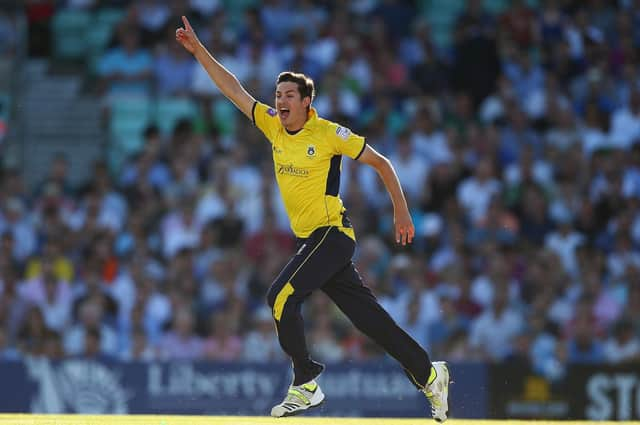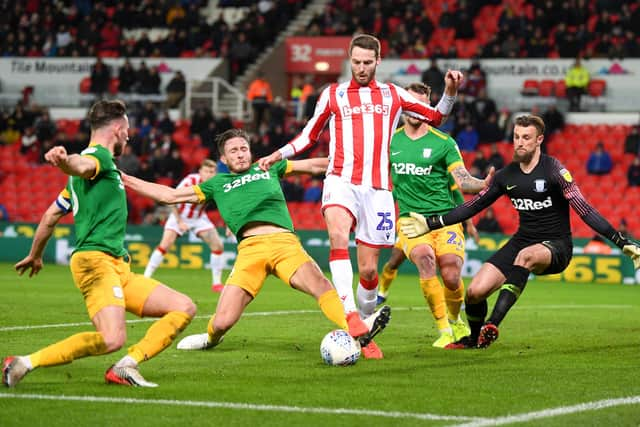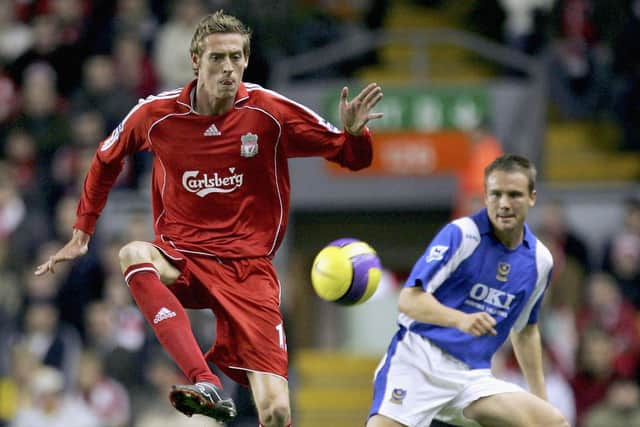Can anything be done to stop the rise and rise of gambling company sponsorship in sport?


In cricket Hampshire played in the John Player Sunday League (1970-1986) and the Benson & Hedges Cup (1972-2002), while Formula 1 teams McLaren and Team Lotus were sponsored by Marlborough and John Player respectively.
The Whitbread, Hennessy and Mackeson Gold Cups were staple diets of the horse racing calendar, while Seagram - the Canadian-based conglomerate that once owned the Coca-Cola brand - became the Grand National’s first sponsor in 1984.
Advertisement
Hide AdAdvertisement
Hide AdCigarette company Embassy sponsored both the World Snooker Championships and the World Darts Championship for many years, and the Silk Cut brand was synonymous with the Rugby League Challenge Cup.


In football, anyone remember the Watney Cup? The pre-season tournament - sponsored by brewers Watney Mann - lasted for four years in the early 1970s, and was contested by the teams (two in each division) that had scored the most goals in each of the four tiers of the Football League the previous season who had not been promoted or qualified for a European competition. Pompey never took part.
But in 2003 legislation was brought in banning cigarette company sponsorship of sporting teams and events, and though alcohol companies can still sponsor clubs and competitions the days of Carlsberg (Liverpool), Holsten (Tottenham), McEwans (Blackburn), Strongbow (Leeds) and Chang (Everton) regularly appearing on clubs’ shirts are gone. They may never return.
The 2017/18 season was the first in Premier League history when none of the competing clubs had an alcohol-related sponsor on their shirt.
Advertisement
Hide AdAdvertisement
Hide AdInstead, as in many sports, gambling companies now occupy centre stage. This season, half of the Premier League clubs have a betting company as their shirt sponsor. In the Championship, the total is a remarkable 16 out of 24. One company - Bet32 - sponsor FOUR different second tier clubs (Derby, Middlesbrough, Stoke and Preston). And lest we forget, even the EFL are sponsored by SkyBet.


One national newspaper last year reported that the 20 Premier League clubs will earn almost £350m from their shirt sponsorship deals in 2019/20 - an average of around £17.5m per club.
Down in the second tier, Stoke City’s shirts are sponsored by Bet365 and the club’s ground was renamed four years ago as the Bet365 Stadium. There is a simple reason for this - Stoke chairman Peter Coates is the co-founder of Bet365 along with his daughter Denise.
Last year, Denise - Bet365’s chief executive - banked an annual salary of £276.5m, PLUS dividend payments of about £45m from her shareholding.
Advertisement
Hide AdAdvertisement
Hide AdHer total pay equated to £1.3m for every working day last year. It is 9,500 times the average UK salary and more than 2,000 times the amount paid to the prime minister, Boris Johnson.


In all, her £323m salary was the highest amount paid to the chief executive of a British company in history. It shattered the previous record of £265m ... set by Coates a year earlier.
Elsewhere, the World Snooker Championships have been sponsored by a betting company since 2006 - Betfred currently has the honour - while Ladbrokes and William Hill sponsor the Scottish League and Scottish FA Cup respectively.
Ladbrokes also sponsor the UK Darts Championship and a huge list of horse races around the UK.
Advertisement
Hide AdAdvertisement
Hide AdThe rise in gambling sponsorship - both in terms of tournament branding and the amount of television ads featuring celebrities such as the actor Ray Winstone, ex-Pompey boss Harry Redknapp and former Leicester midfielder Robbie Savage - has been extraordinary, and has worried many in the health industry. For in the same way people can get hooked on smoking, drinking or hard drugs, so they can get hooked on gambling.
Indeed, gambling is more internalised. An addiction to alcohol, smoking or hard drugs can manifest itself in obvious tell-tale signs of addiction on a person’s body. That is not the case with gambling at all.
‘Gambling addiction can have a devastating effect not just on patients, but also their families. It can result in people losing their job, and leave families and children homeless.’
Those are the words of Dr Henrietta Bowden-Jones, director of the National Problem Gambling Clinic at Central and North West London NHS Foundation Trust.
Advertisement
Hide AdAdvertisement
Hide AdShe was speaking in 2017 after new research suggested gambling addiction activated the same brain pathways as drug and alcohol cravings.
Another person all too aware of the harm gambling can cause is Matt Zarb-Cousin. He was instrumental in the Campaign for Fairer Gambling, an organisation which lobbied successfully for a reduction in the maximum stake on fixed odds betting terminals from £100 to £2 a spin. He recently launched a new campaigning group Clean Up Gambling.
Gambling can have a ‘profound effect on someone’s mental health, and it can be very, very difficult to get back to normal life without therapy and treatment and a lot of effort,’ Zarb-Cousin told The News.
‘It can have more impact than physical substances. You can’t overdose on gambling, you can just go on until you lose all your money. I’m not saying overdosing is a good thing, but it can act as a natural buffer.
Advertisement
Hide AdAdvertisement
Hide Ad‘The government has to look at all sponsorship and advertising, under-18s should not be exposed to it.’
In recent days, The News has featured the story of Hampshire cricketer Chris Wood and his long battle with a gambling addiction.
Wood was by no means the first high profile sportsman to go public with such an addiction - ex-Pompey pair Steve Claridge and Paul Merson have well-chronicled stories. But Wood is the first professional cricketer to talk about his addiction while still playing.
He went public with his story in the hope it would help anyone who was in his situation.
There could be many in need of such help.
Advertisement
Hide AdAdvertisement
Hide AdStatistics reveal online betting has increased during lockdown. Stuck at home with nowhere to go, gamblers have been spending more time and money feeding what could one day lead to an addiction.
‘People have obviously had more time on their hands,’ said Zarb-Cousin. ‘Even though there has been no sporting fixtures, there was data released that said 64 per cent of people have gambled as much as they used to, if not more.’
Gambling Commission stats reveal that online slot machine play has risen by 25 per cent during lockdown. Betting on web poker is 38 per cent higher and virtual sports betting has risen 40 per cent since the pandemic started.
The Gambling Commission have also said that gambling on football is worth an estimated £1.4bn a year to the UK betting industry.
Advertisement
Hide AdAdvertisement
Hide Ad‘I remember speaking to one consultant psychologist in the NHS who said slots and in play were the two biggest problems,’ Zarb-Cousin recalled.
‘He said that once every person in the room he was treating were addicted to in play.
‘In play is built for loss chasing. You lose on the first goalscorer and then try to get your money back.
‘The psychologist told me - and this is sad really - that one person told him he couldn’t watch football any more.
‘The betting had destroyed his love of the sport.’
Advertisement
Hide AdAdvertisement
Hide AdWood is also concerned about the high levels of gambling-related sponsorship.
‘You can just gamble all the time if you want, it just consumed me,’ he told The News. ‘You can do it online, you can do it on your phone - it’s just like sending a text.
‘I started off with football accumulators, but in the end it was anything - football, volleyball games I knew nothing about. It was scary, sometimes I’d gamble through the night.’
Regarding the television adverts, he said: ‘They don’t worry me now, but gambling is such a big issue I don’t know what you can do to stop it, I don’t know how you can.
Advertisement
Hide AdAdvertisement
Hide Ad‘I know for some people gambling is just fun, but it can be an illness and it’s wrong to throw it in people’s faces.’
Change, though, could be in the air.
A review of the Gambling Act was promised in the last Queen’s Speech, the government's programme for Parliament.
‘If the review is comprehensive, and it looks at things like stake levels, education, sponsorship treatment … if you can look at all that then public opinion is in favour of increased consumer protection.
‘I’m optimistic.’
There is a template for change. Back in March 2018, Australia banned gambling ads during broadcasts of live sport between 5am and 8.30pm.
Advertisement
Hide AdAdvertisement
Hide Ad‘They don’t want their children growing up exposed to all the advertising while watching football,’ said Zarb-Cousin. ‘The kids knew the brand names, they knew what odds were - this was happening in children as young as six.
‘Children under 18 should not be exposed to gambling advertising, otherwise you are storing up a lot of problems for the future.’